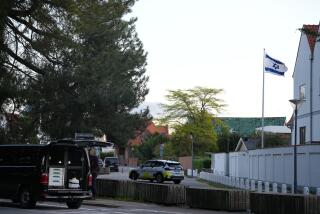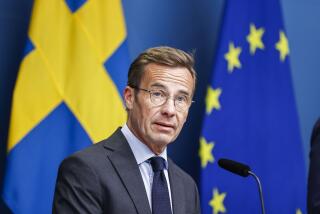Protesters Burn Two Embassies in Syria Over Cartoons of Prophet
- Share via
BERLIN — The furor over satirical cartoons depicting the prophet Muhammad intensified across the world Saturday as Syrian protesters set fire to the Danish and Norwegian embassies in Damascus and Iran threatened to stop trade with European countries where newspapers had published the caricatures.
The outrage has been particularly fierce in the Middle East, and the 12 drawings that first appeared in Denmark have aggravated tensions between the Muslim world and a largely secular Europe. Government and religious leaders have called for calm, but the anger in the streets from Gaza City to Jakarta has been marked by burning flags and calls for bloodshed.
Hundreds of demonstrators in Damascus, Syria’s capital, stormed through concrete barriers and set the Danish Embassy ablaze. No injuries were reported, but the building, which also houses the Swedish and Chilean embassies, was heavily damaged, according to news reports. As smoke whirled skyward, protesters throwing stones and chanting “God is great” attacked the nearby Norwegian mission, which also was heavily damaged.
The demonstrators yelled: “With our blood and our souls we defend you, O prophet of God.”
Riot police pushed crowds back with tear gas and water hoses and prevented an attack on the French Embassy. Denmark, Sweden and Norway complained that the Syrian authorities had not done enough to protect their embassies. Sweden called the Syrian ambassador in Stockholm in protest.
“It took a long time before they put in all their force; it took hours before they all came,” a Western diplomat said by phone from Damascus. “It’s strange that it could go so out of hand. You know what kind of state this is, so if something goes out of hand, it’s strange.”
United Nations Secretary-General Kofi Annan called for calm Saturday. The Vatican said that the drawings were an “unacceptable provocation” and the right to freedom of expression “cannot entail the right to offend the sentiment of believers.”
German Chancellor Angela Merkel, speaking at a security conference in Munich, said escalating violence would accomplish little. “I can understand that religious feelings of Muslims have been injured and violated,” she said, “but I also have to make it clear that I feel it is unacceptable to see this as legitimizing the use of violence.”
The cartoons, including one showing Muhammad wearing a turban shaped like a bomb and another depicting him as saying heaven has run out of virgins for suicide bombers, spurred brief protests when they were published in September in Denmark’s Jyllands-Posten newspaper. In recent weeks, however, other European papers have run the drawings in a show of solidarity for freedom of speech and Western democratic values.
Many in the Muslim world view the cartoons as an assault on Islam that underscores an insensitivity to Europe’s growing Muslim population.
“I believe there are a lot of people who agree with what happened here today, with the burning,” said Mohammed Habash, a Syrian legislator and director of the Islamic Studies Center in Damascus. “A lot of our people believe they have a right to do something because they started to say something against the prophet Muhammad.”
Habash condemned the embassy attacks as un-Islamic. But he also argued that the West had failed to understand the depth of anger roused by the publication of the cartoons -- and the severity of the crisis it could provoke in the Muslim world.
On Saturday, Iran issued its economic threat. “A committee has been formed to review trade ties,” news reports quoted a spokesman for President Mahmoud Ahmadinejad as saying.
In Jordan, authorities arrested Jihad Momani, editor of a weekly newspaper that printed the cartoons last week, and charged him with blasphemy. The protests also spilled over into Israel for the first time, after two days of angry demonstrations in the West Bank and Gaza. Several hundred Israeli Arabs marched through the northern city of Nazareth, where the Bible says Jesus spent his childhood, to express solidarity with Muslim protesters elsewhere.
In South Africa, a court banned the country’s newspapers from reprinting the drawings, Associated Press reported.
The caricatures have become the crux of a culture war defined by new reports of Muslim protests countered by more European newspapers publishing the drawings. Protesters hurled stones in Copenhagen and marched in London on Saturday, and a Polish newspaper printed the cartoons, joining newspapers in Germany, France, Italy and other countries.
European protests have been muted compared with those in the Middle East and Asia. But officials are concerned that Muslim demonstrations in Europe could spark counter-protests by neo-Nazi groups. Europe’s Muslim population has doubled in the last two decades, leading to increased support for some right-wing parties that have moved from the political fringes to seats in parliaments.
*
Times staff writer Laura King in Jerusalem and Megan K. Stack in Beirut contributed to this report.
More to Read
Sign up for Essential California
The most important California stories and recommendations in your inbox every morning.
You may occasionally receive promotional content from the Los Angeles Times.














